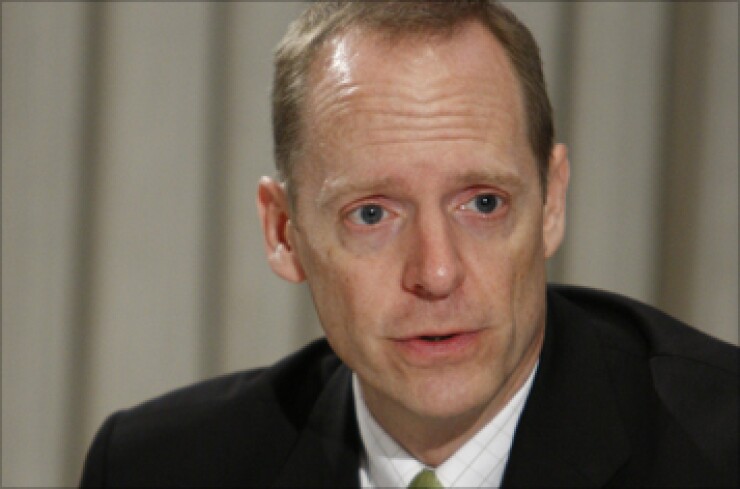
WASHINGTON – Eliminating the tax exemption for municipal bonds over a nine-year period would have cost state and local governments roughly $500 billion in additional borrowing costs, while a cap on the exemption would have cost them about $175 billion, state and local officials here said Tuesday.
Speaking on a panel in the Rayburn House Office Building, they stressed munis are the "primary tool in the toolbox" for funding infrastructure. They said they will resist any efforts to cap tax exemption as part of any comprehensive tax reform plan.
Matt Chase, executive director of the National Association of Counties (NACo), called tax-exempt bonds a "key fundamental building block" that he said are "great" for investors and allow state and local governments to own and operate much of their infrastructure.
He warned that if municipal bonds had been taxable from 2003 through 2012, financing for the 21 largest infrastructure projects would have cost state and local governments an additional $495 billion of interest expense. If a 28% cap on tax-exempt interest had been in effect, the additional costs to those governments would have been about $173.4 billion.
"It's a huge amount of money," Chase said.
NACo called tax-exempt bonds a "critical financing tool" for counties, and cited the $3.2 trillion in infrastructure investment financed through munis issued by state and local governments between 2003 and 2012. The group said that through the issuance of munis, state and local governments invested 2.5 times more in infrastructure than the federal government, adding that counties own and operate 45% of public roads and highways, own nearly one-third of transit systems and airports, and more than 2,900 jails.
Los Angeles County, the largest county in the U.S., is in need of a new $2.5 billion jail facility, and Chase said the only way to pay for that construction would be through munis.
Timothy Firestine, chief administrative officer for Montgomery County in Maryland, has seen firsthand the importance of the muni exemption in a triple-A-rated county of more than 1 million residents and a budget larger than that of five states.
Although the county has a $5 billion operating budget, $4 billion capital budget and $5 billion worth of debt outstanding, it still has large infrastructure needs, he said.
"We calculated the cost to Montgomery County if the exemption didn't exist," Firestine said. "We would be paying $40 million each year to service the debt we have outstanding."
"That's the equivalent of 266 police officers," he added. "There is value in something we clearly get from the exemption. We get to provide these kinds of positions."
He said he was concerned about some of the ideas he has heard on Capitol Hill, but stressed that it is "okay to look at other ideas and diversify," as long as you "stick with what's worked."
In his last five budget requests, President Obama has proposed a 28% cap on the exemption for muni interest, while the Senate fiscal 2014 budget resolution also suggested the possibility of a cap on tax expenditures without mentioning tax exemption specifically. Opponents have said that munis are an inefficient way of financing infrastructure, and that alternatives should be explored.
The GOP tax plan released by the House Ways and Means Committee in June suggested repealing exemptions, deductions, and credits, but does not identify them or mention munis directly. Muni market participants are also fearful that the standing of munis may be in jeopardy under President-elect Donald Trump's tax plan, which many say still lacks detail. Trump has also proposed $1 trillion in infrastructure spending to be funded primarily through tax credits.
Scott Pattison, executive director and chief executive officer of the National Governors Association, said that revenue sources to fund infrastructure need to be contemplated. He said the gas tax is a decreasing source of revenue because cars are more fuel efficient. States are currently experiencing modest growth, although total state spending decreased in fiscal 2016 and revenue growth is expected to remain slow in fiscal 2017, he said, an uncertainty that makes munis all the more appealing as an inexpensive way for states to fund infrastructure.
"We don't talk about them much – they're not sexy, but they're an effective way at the state and local level to get and raise enough money for infrastructure," Pattison said. "They're still an important tool in the toolbox."
Other groups that have called on lawmakers to maintain the tax exemption on municipal bonds include the National Association of Bond Lawyers, the Government Finance Officers Association and the U.S. Conference of Mayors (USCM).
Tuesday's panel was moderated by Clarence Anthony, executive director of the National League of Cities, who also strongly supports the muni exemption.
"Maintaining [bonds'] tax-exempt status is essential to all levels of government," Anthony said. "Muni bonds are the primary way states finance infrastructure for the citizens who live in our communities. Whether it's facilities, hospitals or roads, that is the tool we use the make sure that these projects come to fruition."
The panel was the first in a series of briefings meant to increase congressional awareness of the partnership between state and local governments, which Anthony said "run" the country.





